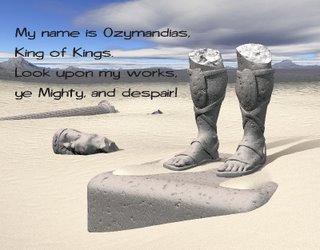In this post, we are going to discuss some short solved questions related to the poem Not Marble Nor the Gilded Monuments by William Shakespeare. We’ve done a detailed analysis and summary of the poem which you can access by search this site. Here, we’ve listed some of the popular questions for your reference and study.
1. What has Time been portrayed as, and Why?
Time has been portrayed as a man carrying the banner in his hands.It has been portrayed so because there is nothing more powerful than man, although man’s identity and importance is very small in relation to time. Secondly, time has been portrayed as a human being because the poem is meant for them.
2. The poet says that neither forces of nature nor wars can destroy his poetry. In fact, even godly powers of Mars will not have a devastating effect on his rhyme. What quality of the poet is revealed through these lines?
The perpetuity of his poetic art and the immortality of his verse is a characteristic attribute which can be noticed in the quality of the poet. It is a well-known fact that like Time and Nature, literary art is also eternal and permanent, making poets live through their work, for thousands of years.This turned out to be the simple truth, because Shakespeare’s sonnet is still being read after over four hundred years, while few marble gravestones, marble markers, or gilded monuments have remained in existence for that long, having been overturned, uprooted, or destroyed by wars.
3. Why does the poet refer to Time as being sluttish?
The poet refers to Time as sluttish for the reason that it spoils the patterned or gilded monuments. It discolours them, spoils them and ruins them progressively through its various agents or forces. These agents are like air, rain, natural vegetation, etc.Sluttishhere just means really disgustingly messy.The lines repeat the theme of strong, supposedly permanent things decaying as time goes by.
4. What How does the poet immortalize his beloved?
The poet immortalizes his beloved by saying that his beloved shall live forever in this sonnet and in the eyes of generations to come. Also he will wear out this world till the judgement day and live longer than it. The individual being addressed in the sonnet will live longer in human memory because he is cherished in the poem.He is simply saying that the poem he is writing to some unnamed person will last longer than marble gravestones or stone monuments decorated with gold dedicated to departed royalty. And the individual being addressed in the sonnet will live longer in human memory because he is enshrined in the poem.
5. In this sonnet by William Shakespeare, what does the line “The living record of your memory” means?
The living record is the verse or sonnet that is transcribed to immortalize the young man. Shakespeare thought that as long as the poem was read by others the man would live always.Death and all its antagonism will not stop him. All of the future age group even to the end of time will praise him.Therefore, until Judgment Day when he will be taken to heaven, this poem will be an acknowledgment to him and live forever in the lovers’ eyes who read this poem.
Shakespeare often wrote as though his poetry had a life of its own, as he does in this verse. As long as this poem is recited by future groups, this person will remain to live.It is a fact that this prediction came true: We are still reading this poem four hundred years later.
6. Who is the speaker in the poem “Not marble nor the glided monuments”?
The speaker in this sonnet is apparently Shakespeare himself. He is very confident of his genius as a poet, and he is saying that the sonnet he is in the process of creating will survive structures made of marble and other stones. It is worth mentioning that the imagery is very strongly associated with garden of remembrance. This suggests that the person to whom this sonnet is addressed has recently died and that this particular sonnet is a monument or requiem.Otherwise it would seem inappropriate to use such melancholic images in a love sonnet addressed either to a living man or woman. It would create an unfriendly imprint on the person to whom the sonnet was addressed.
His sonnet was written some four hundred years ago and has survived many gilded monuments of princes. Most of the buildings that existed in Shakespeare’s time, have been destroyed by time or by war, but his sonnets are being read by millions of people, including students. The speaker in all of Shakespeare’s sonnets, since they were personal and lectured to a single individual, can be assumed to be Shakespeare himself.
7. What causes the speaker’s spirits to rise?
The speaker is maintaining that he is giving someone prolonged existence through his poem which will last longer than monuments committed to the most powerful individuals. The final couplet means precisely that the poem will keep the loved one’s memory alive until Judgment Day, at which time all the spirits of the dead, including his own, will rise from their graves to be judged as to whether they be worthy of to be sent to heaven or hell.
8. What is the subject matter of the sonnet by William Shakespeare?
The Shakespeare’s sonnet 55 is one of many poems in his collection of sonnets that deal with the subject of flexibility, or the constant change and unpredictability that are typical of life on earth. Uncertainty was a favourite subject of writers during the middle ages and the Renaissance.In fact sonnet 55 is one of the classic expressions of this idea. At the same time, the poem also emphasizes another key idea from this period, the idea that being distinguished in great poetry can help the person adorned in such poetry to cheat mutability, including death, by giving him or her a status that will last forever.Yet Shakespeare ends this poem with a cunning turn, suggesting that the only way to achieve true immortality and divine existence is to be saved at the end of time by God.
9. What was the thought of Shakespeare in the Sonnet “Not Marble Nor The Gilded Monuments”?
This outstanding sonnet is engrossed with a common concern that runs throughout Shakespeare’s collection of Sonnets: how poetry can give immortality to the beauty and love of the person that the sonnet is written to. This sonnet begins by associating the ability of this poem to preserve the beauty of the loved one to the gilded monuments of princes. The poem here is being equated to one of those gilded monuments in its ability to reserve. However, the poem will exist perpetually, compared to the monuments that, through the ravages of sluttish time are destined to destruction. As the poem continues the speaker cultivates this theme. War will downturn statues and terminate them, rendering the memory of the great people they were supposed to remember outdate. However, being captured in stanza spares the memory of the loved one.
10. What is the irony in “Nor Mars his sword, nor war’s quick fire shall burn The living record of your memory.”?
The irony is that poetry, written on paper, is guaranteed to outlast stone and marble monuments. This sonnet is about a young man and there may be an inference that a poem about an everyman will outlast a monument to a ruler. War will destroy these monuments, but the irony is that “war’s quick fires” cannot destroy the eternal memory documented in poetry.
Apparently, paper burns more easily than stone. Poetry has an everlasting potential because the words on the page express an indispensable intellectual meaning, a poem can be passed on verbally in cultural memory.Therefore, poetry is both physical and hypothetical and can escape the wearing down of time. Shakespeare is also making the point that both the subject and the author of the poem can attain immortality in this way. However, the secondary irony is that we have no idea who the young man, the subject, of the poem is. But we all know Shakespeare. So, he was half right.
Suggested Reading: Not Marble Nor the Gilded Monuments Summary by William Shakespeare in Hindi
Some online learning platforms provide certifications, while others are designed to simply grow your skills in your personal and professional life. Including Masterclass and Coursera, here are our recommendations for the best online learning platforms you can sign up for today.
The 7 Best Online Learning Platforms of 2022
- Best Overall: Coursera
- Best for Niche Topics: Udemy
- Best for Creative Fields: Skillshare
- Best for Celebrity Lessons: MasterClass
- Best for STEM: EdX
- Best for Career Building: Udacity
- Best for Data Learning: Pluralsight
















